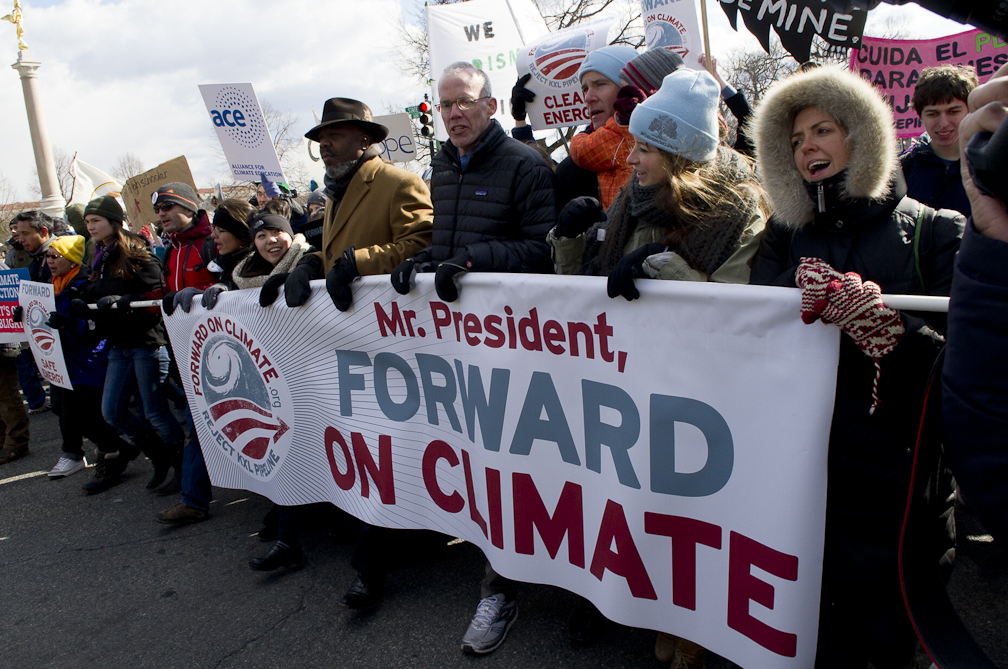
More than 35,000 people gathered in Washington, D.C. on Sunday to urge President Obama to confront climate change. Farmers, religious leaders, scientists, union workers, students, and more came together because we can't afford to wait any longer. Climate change is already threatening our communities with extreme weather and costly damages. The time to act is now.
Fortunately President Obama has the power to stop a major source of global warming pollution from spreading: tar sands oil. The production of tar sands oil generates three times as many greenhouse gases as the production of conventional crude. And yet big oil corporations want to expand tar sands production and generate more pollution.
The president can shield us from this pollution by rejecting the Keystone XL pipeline. Big oil companies would like us to believe tar sands expansion in a foregone conclusion, but economic and political realities reveal the future of the industry hinges on that pipeline. They need to haul their land-locked product through America's breadbasket to the Gulf of Mexico for export in order to compete with cheaper fuels.

Climate march to the White House, February 17, 2013. Photo Credit: Melanie Blanding
Numerous financial analysts and oil executives agree that the current opposition to Keystone XL is already slowing expansion. In a report released in January 2013, Standard & Poor's forecast that delays in approving new pipelines are putting future tar sands production growth at risk. TD Economics, part of a major Canadian bank, came to a similar conclusion about the tar sands industry, calling pipeline capacity constraints "a serious challenge to its long-term growth."
"Unless we get increased [market] access, like with Keystone XL, we're going to be stuck," explained Ralph Glass, an economist and vice president at AJM Petroleum Consultants. "We're going to hit a wall at some point in time and our... production is going to be the one backed out of the system."
Tar sands companies can't simply choose another route if Keystone XL gets blocked; no other viable alternatives exist right now. CIBC, a major Canadian financial services firm, recently concluded the pipelines proposals for hauling tar sands oil to Canada's West Coast have a less than 50 percent chance of being built.
The Northern Gateway pipeline to the British Columbia Coast, for instance, is highly unpopular in that province, where 60 percent of residents oppose the project and aboriginal communities have refused to grant necessary easements. "I personally don't think Northern Gateway will go through anytime soon or if it ever will," said Roger McKnight, a senior petroleum adviser at En-Pro International Inc. "There's just too much politics in the soup and there are too many environmental concerns in the soup and there's aboriginal rights in the soup and that makes for a pretty unsavory soup."
Meanwhile, efforts to ship tar sands to Eastern Canada or the Northeast United States are equally uncertain. Several layers of approvals stand in the way of access to coastal ports.
In light of pipeline problems -- and the changing economics of the North American oil supply -- many oil companies are starting to shift investments out of tar sands. Suncor, the oldest operator in the region, has signaled three of its most important new projects are unlikely to proceed. Canadian Natural Resources Ltd cut capital spending by $680 million from its Horizon tar sands project last year. "There has been a loss of faith in the economics that are being presented by the producers here," Vice-President of Investor Relations at MEG Energy Corp John Rogers told the Globe and Mail.
Keystone XL is the chokepoint for the tar sands industry, and it's time we closed it off for good. We don't need this dangerous pipeline and its dirty oil to power our economy; we have safer, cleaner solutions. President Obama raised fuel economy standards to 54.5 miles per gallon by 2025, for instance. These standards alone will save drivers more than $80 billion a year at the pump while cutting our oil use by one-third and carbon pollution from new cars in half.
I applaud President Obama's commitment to fighting climate change. Approving Keystone XL would contradict that commitment. At the rally on Sunday, thousands of concerned citizens called on President Obama to lead our nation forward, not backward into darker, more polluted days. He can do that by promoting clean energy and reducing carbon pollution from power plants. But he must also reject the Keystone XL pipeline so that tar sands oil can be left where it belongs: in the ground.
